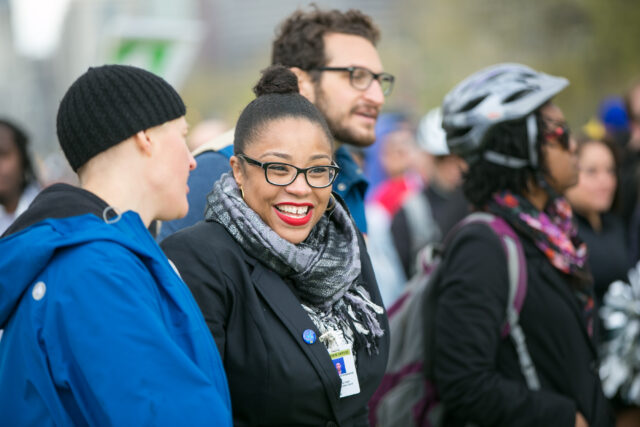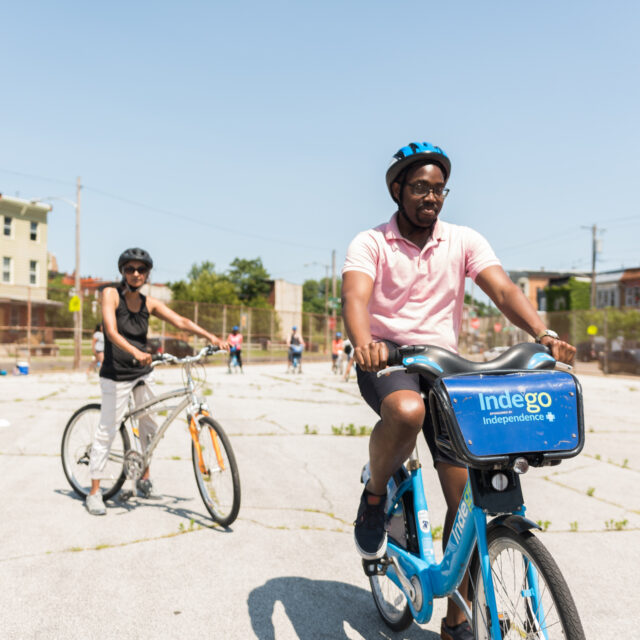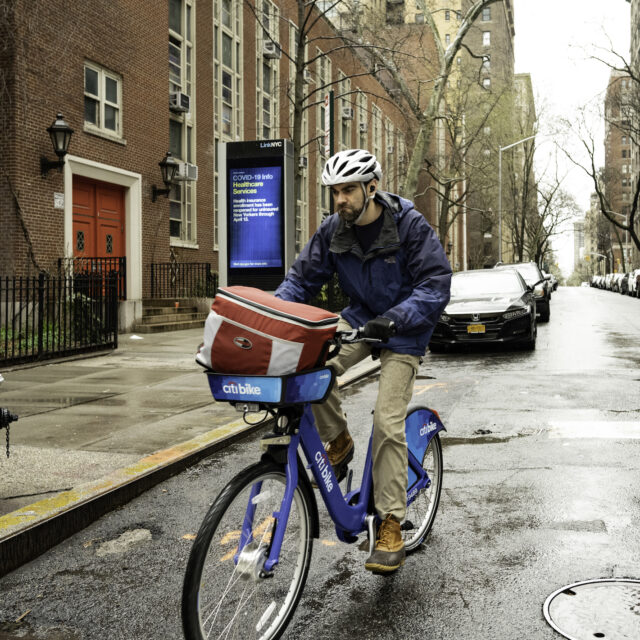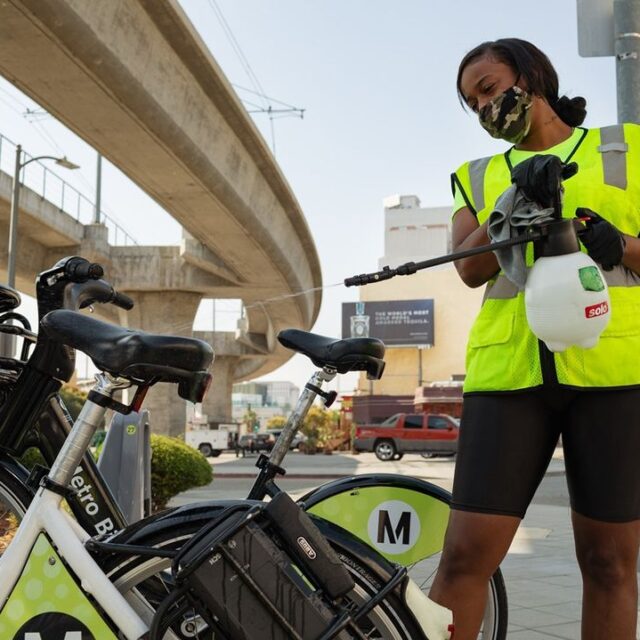Bicycle Transit Systems Has a Chief Equity & Strategy Officer
by Kiran Herbert, Communications Manager
April 21, 2021
We spoke with Carniesha Kwashie about what operationalizing diversity, equity, inclusion and justice looks like.

Carniesha Kwashie at the launch of Philadelphia’s Indego bike share system in 2015.
In one of Carniesha Kwashie’s first gigs, she managed seven different job sites across the country, trying to get people of color, as well as lower-income individuals and women, into green jobs in the construction and manufacturing trades. Whenever she went into a community to speak with stakeholders, Kwashie would ask about their top priorities. Across sites, the one thing that continuously came up was transportation.
“I was always really curious about that, and how transportation either created opportunity or served as a barrier for people trying to access positions in these trades that would provide an opportunity to economic mobility,” says Kwashie.
That curiosity pushed Kwashie to apply for a job with the City of Philadelphia, working as a grant manager for what would become the Better Bike Share Partnership. At the time, she didn’t even know what bike share was. “Since then I’ve fallen in love with one of America’s newest industry sectors because of the potential it has to create opportunities and access to resources that can benefit the people I love to serve,” says Kwashie.
The opportunity to address bike share’s inequity was huge and Kwashie dove in, working at BSSP for about three years. After leaving to serve as a director at United Way, Kwashie accepted a job at Bicycle Transit Systems, the company that runs Indego, Philadelphia’s bike share system, as well as those in Los Angeles and Las Vegas. Kwashie’s title at Bike Transit is “Chief Equity and Strategy Officer,” a role that’s unique in the shared micromobility space.
In the following Q&A, Kwashie discusses her new position, what it looks like to operationalize DEIJ in bike share and the importance of learning to listen.
A Conversation with Carniesha Kwashie
BBSP: How did this position come about and why did you accept it?
Carniesha Kwashie: I have to give a huge shoutout to [Bicycle Transit Systems’ President and CEO] Alison Cohen and the whole Bike Transit team. Prior to my arrival they worked with a third-party expert and created a plan that focuses on attracting and retaining talent, ensuring that riders see themselves in our actions and that we become an internal and external partner that advocates for justice. A desire to continually improve really helped drive this position. For me, any company that’s going to be committed to those things and explicit about tackling and addressing systemic oppression, such as racism, is really appealing.
What opportunities does a position like this offer?
I get really excited about the opportunity to be on the employer side and to help an organization/company really look at all of its business functions, fostering and improving the collaboration to ensure that everything we do is being done through the lens of diversity, equity, inclusion and justice.
This position provides an opportunity not just to look at how the community is going to be impacted but how we impact each other as teammates and as colleagues; how the very decisions we make drive whether we’re going to be deemed as that provider of choice to the various individuals that we serve throughout the three cities in which our system operates.
It’s a very exciting opportunity because I’m not just focused on the external—I work across everything from HR to finance to customer service to IT to the actual systems themselves. And marketing, of course.
People speak about the importance of diversity, equity and inclusion but justice is often left out.
When we talk about justice, it’s about racial justice, it’s about social justice. Because this is the bike share industry, I would also argue to say that it’s about environmental justice. We know that those things impact the very communities that we serve and if we do not make decisions that are intended to improve the conditions and the life outcomes of those that we hope will access our services, then it will have negative impacts.
Big picture: What does it look like to operationalize diversity, equity, inclusion and justice throughout Bike Transits’ bike share systems?
I’ve dedicated my career to ensuring that any practices and policies that are rooted in diversity, equity, inclusion and justice are really designed to improve life outcomes. And not just for the people we serve, but for the people who work for our company, which oftentimes represents the diversity of the riders that we want to have. So from a long-term perspective, it’s about level setting and having people understand that when we are out here creating policies, practices, or services, we are trying to dismantle systemic oppression that has existed for centuries.
This industry is less than 15 or 20 years old and this to me is a forever change. What I mean by that is that this industry—and any industry that is truly sincere and authentic about creating equity in its policies, practices, and services—the timeline for deploying resources for developing new ways to approach how to improve the systems is a ‘forever.’ As long as I live, I will always fight for diversity, equity, inclusion, and justice, whether it’s in the workplace or on a personal front. So from a long-term perspective, I encourage people to understand that the journey is long—it requires a lifetime commitment.
What about in the short term?
From a short-term perspective, there are things that organizations and individuals can do. At Bike Transit, we have a committee called BOOST, which is really our diversity, equity, inclusion and justice committee. We have it from a central operations level, plus our three local systems all have committees. We’re looking at what we can do to create systems that do not create barriers. While the ultimate goal is to make sure we’re improving those life outcomes for individuals, we also have to be on the ground from a short-term perspective looking year over year, month over month, to how we’re contributing through our actions to support communities and our colleagues.
Can you give an example?
On March 16, we had a “Coffee and Conversation”—monthly meetings with different themes—about what we could do as a company and as individuals to promote stopping the [Asian American and Pacific Islander] AAPI hate and mistreatment that we see happening nationally. We asked, ‘What can we do if we see something like that happening? How can we support each other or the communities we work with that identify as AAPI or serve AAPI?’ That evening was the unfortunate event in Atlanta, Georgia, where six Asian women were killed, eight individuals in total.
Just hours before, we were talking about what we can do. From a short-term perspective, we’re looking at real-time what’s happening: what can we do, what’s our part in it, how can we show up for humanity? Going forward, we’re working to promote practices that give people access to training or materials that really support their individual, as well as collective, development, all with the goal of helping people understand what’s happening around them. Prior to my arrival, similar activities were done in relation to the Black Lives Matter movement and the unfortunate killing of George Floyd.
There’s a lot of short-term things you can do, in terms of recognizing, paying attention and giving adequate time and resources to matters that are important and we know are impacting the very people we serve. From a philanthropic standpoint, we make sure we’re giving to organizations within our service area that represent those communities that are marginalized. It’s important to make sure we’re not just showing up as a service provider, but truly as an ally.
Any advice for the bike share industry as a whole?
It’s really important to see the humanity in everyone, especially those that you serve. As a stakeholder, there’s a certain dignity or lack of dignity that comes with the actions that you take. Once you start to put in your mind that this group is inferior or less influential or more than or less than, you dehumanize the very people that you say you want to serve. You can have all the equations and formulas in the world for how to generate revenue, memberships, or an effective system, but there has to be respect, dignity and love at the root of it.
In the bike share industry, it’s about establishing that baseline of dignity, love and respect. That goes for employers, that goes for municipalities—that goes for anyone who really believes that this industry can provide that equitable access to affordable transportation options. It’s also about listening to the community because, at a great company, the community makes up your workforce.
How do we become better listeners?
Listening matters, and it requires listening internally, through surveys, through “Coffee and Conversations,” and through dialog on the day-to-day. It also requires listening externally to your community partners or those stakeholders that have influence in terms of what you’re trying to achieve from a bike share system perspective. What I mean by influence is not just about who can ride or be a member today, but also about who has the potential to have us understand what it will mean to be successful somewhere.
By listening to what the community says it needs, you can align what they say they need—what their priorities are—with what your program or services will do. You have to really look at your intentions. Are they aligned with what this community says it needs? If so, great. If not, then you need to do some further discovery on why there’s not alignment. Listening is a really important part of this equation, as is valuing people. Everyone has something great to offer when it comes to creating affordable, accessible transportation options. It’s all about putting some heart behind what you do.
The Better Bike Share Partnership is funded by The JPB Foundation as a collaborative between the City of Philadelphia, the National Association of City Transportation Officials (NACTO) and the PeopleForBikes Foundation to build equitable and replicable bike share systems. Follow us on Facebook, Twitter and Instagram or sign up for our weekly newsletter. Got a question or a story idea? Email kiran@peopleforbikes.org.



